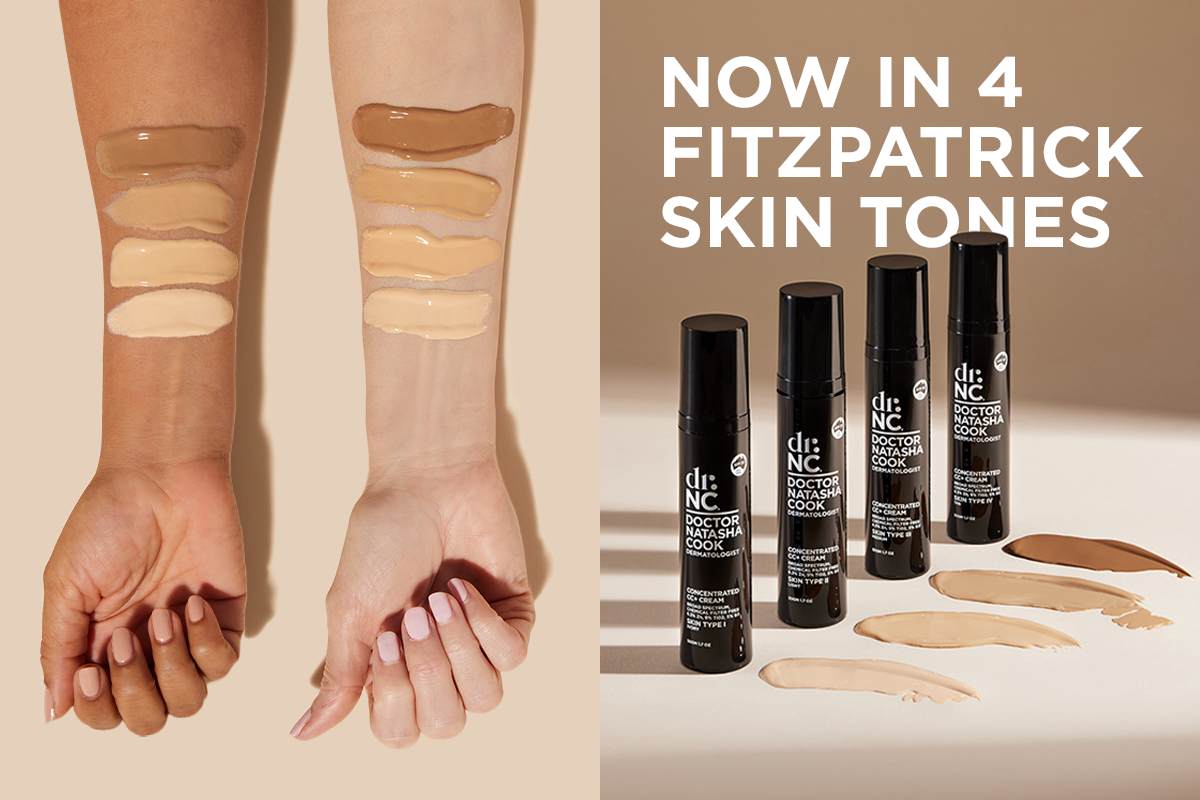
Here at DrNC I’m proud to announce that we have officially launched TWO new shades of my Concentrated CC+ Cream SPF30.
There are now 4 shades to choose from - Ivory, Light, Medium and Tan - and these four shades aim to cover the most common skin types and shades, based on the true dermatologist classification of Fitzpatrick skin types.

This classification is the gold standard when it comes to knowing your skin type, also known as the Fitzpatrick skin phototype, developed in 1975 by dermatologist Dr. Thomas Fitzpatrick.
It categorises your skin into one of six types by its ability to tolerate sun exposure, moving from fair (Type 1) to dark (Type 6) skin.

FITZPATRICK SKIN TYPES
IVORY
TYPE 1: Always burns, very pale
CELEBRITY MATCH: Nicole Kidman / Emma Stone / Elle Fanning / Prince Harry
LIGHT
TYPE 2: Usually burns rarely tans
CELEBRITY MATCH: Reese Witherspoon / Taylor Swift / Margot Robbie / Harry Styles
MEDIUM
TYPE 3: Usually slowly tans to a light brown sometimes burns
CELEBRITY MATCH: Jennifer Aniston / Matthew McConaughey
TAN
TYPE 4: Readily and usually tans, rarely burns
CELEBRITY MATCH: Priyanka Chopra / Eva Mendes / Jennifer Lopez / Antonio Banderas
The last 2 fitzpatrick skin types are 5 and 6
TYPE 5: Brown skin, readily tans dark. Very rarely burns
CELEBRITY MATCH: Tyra Banks / Will Smith / Beyonce
TYPE 6: Dark brown always tanned, never burns
CELEBRITY MATCH: Serena Williams / Lupita Nyong’o / Oprah Winfrey / Don Cheadle
We will continue to work on darker shades with a skin darkening adjuster that is currently in development, to suit darker skin types.

3 REASONS WHY YOU’LL FALL IN LOVE WITH MY CONCENTRATED CC+ CREAM SPF30
1. CHEMICAL FILTER-FREE, PHYSICAL SPF30 PROTECTION
There are two types of sunscreens: Chemical and physical. The difference? It all comes down to the specific ingredients and the particular types of sun-protecting agents included in the formula.
Physical blockers (zinc and titanium dioxide) and chemical filters (like oxybenzone) are not all created equal.
So, why do I prefer physical blockers and why is my Concentrated CC+ Cream a physical SPF?
Chemical sunscreens work thanks to chemical compounds that absorb the sun’s rays before they hit the deeper layers of the skin, preventing sun damage. But these chemicals can create allergic reactions, especially if you have sensitive skin.
When I was completing my dermatology training, I worked in a contact allergy skin clinic and witnessed firsthand the impact this had on the skin and people’s quality of life, so I was determined to never work with chemical SPF agents. I am an actual published author in sunscreen reactions and sunscreen allergies.
- Chemical filters are responsible for ALL allergic sunscreen filter reactions.
- Physical filters do not have this effect, so are preferable for sensitive skin types.
So let’s get physical! Physical sunscreens contain naturally occurring minerals - titanium dioxide and zinc oxide. They essentially create a mask, reflecting the sun’s rays so they can’t penetrate the skin.
These minerals are inert, which means they DO NOT create skin allergies or reactions. They’re the safest SPF blockers and the least likely to cause reactions, which is why you’ll find a combination of zinc and titanium dioxide in my Concentrated CC+ Cream.
2. IT’S BOOSTED WITH 5% VITAMIN B3 (NIACINAMIDE)
Every product in my DrNC range is formulated with vitamin B3 (niacinamide), because it is a gentle yet extremely effective antioxidant with the power to transform a range of skin issues, including ageing, acne, rosacea and pigmentation.
But it’s especially powerful when incorporated into an SPF product, because it is the most stable antioxidant that helps fight free radical damage from UV rays and infrared heat. So you’re getting extra antioxidant protection in your daily SPF.
3. THE COLOUR-CORRECTING FORMULA LOOKS LIKE REAL SKIN
When I was creating this product, I set out to make a sunscreen that people would actually want to wear everyday, plus I really wanted them to have the confidence to ditch their heavy foundations and go without makeup.
So after years of trying to perfect the formula, I settled on the perfect amount of coverage that covers redness and uneven skin tone, but still leaves your skin looking like dewy, fresh, natural skin. Plus, it contains light-reflecting particles to leave you looking radiant and fresh.
On top of that, a tinted SPF is actually better than a non-tinted product, if you are serious about protecting your skin from visible light (mainly blue light). The iron oxides that create the tint (ie the colour in the CC+) are the only known defender to date to protect you against visible light!
So yes it is better to tint, than not to tint!
SHOP CONCENTRATED CC+ CREAM NOW
























